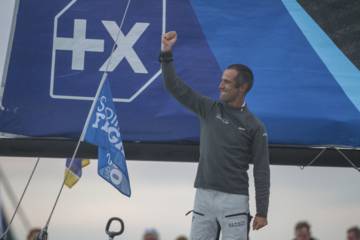
Sailing: Armel Le Cléac’h, back to basics
Thursday, 1 october 2020
Armel Le Cléac’h, like other sailors before him, was not afraid to put his reputation on the line to face young sailing talent in the Solitaire du Figaro: unthinkable (or almost) in any other discipline…
Competing as equals
Sailing is definitely unparalleled in the world of sport! The victory of Armel Le Cléac’h in the recent Solitaire du Figaro is further confirmation of this fact. Just try to imagine transposing what he just achieved in a different sporting discipline. Armel Le Cléac’h won this event for the first time in 2003 before winning it again in 2010. The Solitaire du Figaro is a magnificent event but an arduous sailing competition. Physically demanding and challenging for participants’ morale, this multi-stage race, which leaves precious little time for sleep and requires a great many sailing maneuvers, is generally considered as a testing ground that reveals new talent. This was the case for Armel Le Cléac’h, who was outstanding in the Figaro race since he first began competing in the 2000s. He then rose up to become the great champion that we know today, winner of the Vendée Globe, the English Transat, and holder of a host of records… He could justifiably be content to step back, rest on his laurels and watch the new generations of sailors emerge. However, he didn’t hesitate – just like other great sailors before him such as Michel Malinovsky, Gilles Gahinet, Alain Gauthier, Michel Desjoyeaux, Jean le Cam, etc. – to come back and pit himself against up-and-coming young sailors. He didn’t fear to put his reputation on the line. In the world of contemporary professional sport where extreme attention is paid to one’s public image, where champions are given little leeway on how they manage their image and careers, seeing one of them return to the basics of his sport to compete on an equal footing with future talents deserves our greatest respect. It’s impossible to imagine this in another sport where an outstanding champion decides to take part in a championship, race or tournament that they competed in years before as a young man or woman.
Multiple functions
This is especially true given that Armel Le Cléac’h has also become a mentor, with the work he undertook with Team Banque Populaire with Clarisse Crémer to help her progress and get her ready for the next Vendée Globe. Nor can one imagine a great coach in another discipline becoming once again just another competitor among others, and returning to one of the basic events in his or her sport. Armel Le Cléac’h is committed to transmitting his skills, sharing his experience and accompanying Clarisse Crémer in this round-the-world challenge. As a sailing instructor at the beginning of his career, Armel is now rediscovering the pleasure of passing on his skills. In this way, sailors are sometimes athletes, coaches, and team managers; they fulfill several functions at once that are, in other sports, devolved to several people. This is also why they are special athletes. This multiplicity of function obliges them to demonstrate multiple qualities, some of which may be contradictory at times. For example, the need for these sailors to refocus on themselves, as all athletes do, but also the need for them to remain attentive to their team working on the boat. This is how Armel Le Cléac’h, after winning the Solitaire du Figaro for the third time – which earned him immense respect, especially from the younger sailors – will be returning to his major project of a new Ultime class vessel, due to be launched in the spring of next year. It is difficult, indeed, to imagine another champion doing as much without demonstrating in the process that essential humility which, beyond considerations of a personal nature, is certainly the cardinal virtue of sailors!
Discover the Solitaire du Figaro photo album
Photo credit: Alexis Courcoux